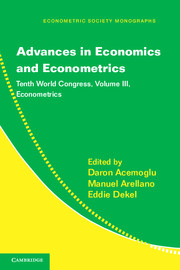Book contents
- Frontmatter
- Contents
- Contributors
- Preface
- I ECONOMETRICS OF INDUSTRIAL ORGANIZATION
- 1 Game Theory and Econometrics: A Survey of Some Recent Research
- 2 Recent Developments in Empirical IO: Dynamic Demand and Dynamic Games
- 3 Estimation of (Dynamic) Games: A Discussion
- II MACROECONOMETRICS
- III ECONOMETRIC THEORY
- IV EMPIRICAL MICROECONOMICS
- V TIME SERIES AND PANELS
- VI MIRRLEES REVIEW: RETHINKING THE TAX SYSTEM FOR THE TWENTY-FIRST CENTURY
- Name Index
- Miscellaneous Endmatter
1 - Game Theory and Econometrics: A Survey of Some Recent Research
Published online by Cambridge University Press: 05 May 2013
- Frontmatter
- Contents
- Contributors
- Preface
- I ECONOMETRICS OF INDUSTRIAL ORGANIZATION
- 1 Game Theory and Econometrics: A Survey of Some Recent Research
- 2 Recent Developments in Empirical IO: Dynamic Demand and Dynamic Games
- 3 Estimation of (Dynamic) Games: A Discussion
- II MACROECONOMETRICS
- III ECONOMETRIC THEORY
- IV EMPIRICAL MICROECONOMICS
- V TIME SERIES AND PANELS
- VI MIRRLEES REVIEW: RETHINKING THE TAX SYSTEM FOR THE TWENTY-FIRST CENTURY
- Name Index
- Miscellaneous Endmatter
Summary
Introduction
In this chapter, we survey an emerging literature at the intersection of industrial organization (IO), game theory, and econometrics. In theoretical IO models, game theory is by far the most common tool used to model industries. In such models, a researcher specifies a set of players and their strategies, information, and payoffs. Based on these choices, the researcher can use equilibrium concepts to derive positive and normative economic predictions. The application of game theory to IO has spawned a large and influential theoretical literature (see Tirole [1988] for a survey). Game theory can be used to model a broad set of economic problems; however, this flexibility sometimes has proved problematic for researchers. The predictions of game-theoretic models often delicately depend on the specification of the game. Researchers may not be able to agree, a priori, on which specification is most reasonable, and theory often provides little guidance on how to choose among multiple equilibria generated by a particular game.
The literature that we survey attempts to address these problems by letting the data tell us the payoffs that best explain observed behavior. In the literature that we survey, the econometrician is assumed to observe data from plays of a game and exogenous covariates that influence payoffs or constraints faced by the agent. The payoffs are specified as a parametric or nonparametric function of the actions of other agents and exogenous covariates. The estimators that we discuss “reverse-engineer” payoffs to explain the observed behavior.
Information
- Type
- Chapter
- Information
- Advances in Economics and EconometricsTenth World Congress, pp. 3 - 52Publisher: Cambridge University PressPrint publication year: 2013
Accessibility standard: Unknown
Why this information is here
This section outlines the accessibility features of this content - including support for screen readers, full keyboard navigation and high-contrast display options. This may not be relevant for you.Accessibility Information
- 38
- Cited by
